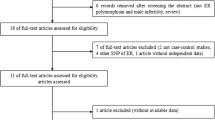Abstract
Purpose
This study investigated genetic variations in the estrogen pathway and their association with miscarriages.
Methods
A total of 483 patients were recruited from a comprehensive control group for case–control studies. Three variants of the CYP19A1 gene (rs10046, rs4646 and rs700519) and one variant each of the estrogen (ESR1) and progesterone (PGR) receptor genes (rs3020314 and rs1042838) were investigated using polymorphism genotyping. The chi-squared test and one-way analysis of variation (ANOVA) were used for statistical analysis.
Results
For rs10046 (CYP19A1), the C/C genotype was associated with a greater frequency of miscarriages (P = 0.017). The other genotypes were not found to be associated with recurrent miscarriage.
Conclusions
This is the first study that has identified a single-nucleotide polymorphism in the aromatase gene that suggests a significant association between genotypes and miscarriage. As aromatase is an essential enzyme in the estrogen pathway, it may be speculated that variations in the aromatase gene in some way give rise to different conditions in the endocrine environment that can lead to impaired fertility.
Similar content being viewed by others
References
Bohlmann MK, Schauf B, Luedders DW et al (2007) Current concepts of efficient diagnosis and therapeutic options in patients with recurrent early abortions 67:217–227
Royal College of Obstetricians and Gynaecologists (2003) The investigation and treatment of couples with recurrent miscarriage. RCOG Guidel 17:1–13
Rai R, Regan L (2006) Recurrent miscarriage. Lancet 368:601–611. doi:10.1016/S0140-6736(06)69204-0
Roussev RG, Coulam CB (2007) HLA-G and its role in implantation. J Assist Reprod Genet 24:288–295. doi:10.1007/s10815-007-9148-3 review
Karhukorpi J, Laitinen T, Kivela H et al (2003) IL-1 receptor antagonist gene polymorphism in recurrent spontaneous abortion. J Reprod Immunol 58:61–67. doi:10.1016/S0165-0378(02)00044-X
Yan WH, Fan LA, Yang JQ et al (2006) HLA-G polymorphism in a Chinese Han population with recurrent spontaneous abortion. Int J Immunogenet 33:55–58. doi:10.1111/j.1744-313X.2006.00567.x
Dawood F, Mountford R, Farquharson R et al (2007) Genetic polymorphisms on the factor V gene in women with recurrent miscarriage and acquired APCR. Hum Reprod 22:2546–2553. doi:10.1093/humrep/dem210
Glueck CJ, Sieve L, Zhu B et al (2006) Plasminogen activator inhibitor activity, 4G5G polymorphism of the plasminogen activator inhibitor 1 gene, and first-trimester miscarriage in women with polycystic ovary syndrome. Metabolism 55:345–352. doi:10.1016/j.metabol.2005.09.008
Oates-Whitehead RM, Haas DM, Carrier JA (2003) Progestogen for preventing miscarriage. Cochrane Database Syst Rev (2):CD003511
Albrecht ED, Aberdeen GW, Pepe GJ (2000) The role of estrogen in the maintenance of primate pregnancy. Am J Obstet Gynecol 182:432–438. doi:10.1016/S0002-9378(00)70235-3
Alessio AM, Siqueira LH, Couto de Carvalho EC et al (2008) Estrogen receptor alpha and beta gene polymorphisms are not risk factors for recurrent miscarriage in a Brazilian population. Clin Appl Thromb Hemost 14(2):180–185
Altmae S, Haller K, Peters M et al (2007) Allelic estrogen receptor 1 (ESR1) gene variants predict the outcome of ovarian stimulation in in vitro fertilization. Mol Hum Reprod 13:521–526. doi:10.1093/molehr/gam035
de Castro F, Moron FJ, Montoro L et al (2004) Human controlled ovarian hyperstimulation outcome is a polygenic trait. Pharmacogenetics 14:285–293. doi:10.1097/00008571-200405000-00003
Sowers MR, Jannausch ML, McConnell DS et al (2006) Menstrual cycle markers of ovarian aging and sex steroid hormone genotypes. Am J Med 119:S31–S43. doi:10.1016/j.amjmed.2006.07.004
Schuit SC, van Meurs JB, Bergink AP et al (2004) Height in pre- and postmenopausal women is influenced by estrogen receptor alpha gene polymorphisms. J Clin Endocrinol Metab 89:303–309. doi:10.1210/jc.2003-031095
de Maat MP, Madsen JS, Langdahl B et al (2007) Genetic variation in estrogen receptor, C-reactive protein and fibrinogen does not predict the plasma levels of inflammation markers after long-term hormone replacement therapy. Thromb Haemost 97:234–239
Renner SP, Strick R, Oppelt P et al (2006) Evaluation of clinical parameters and estrogen receptor alpha gene polymorphisms for patients with endometriosis. Reproduction 131:153–161. doi:10.1530/rep.1.00787
Schweikert A, Rau T, Berkholz A et al (2004) Association of progesterone receptor polymorphism with recurrent abortions. Eur J Obstet Gynecol Reprod Biol 113:67–72. doi:10.1016/j.ejogrb.2003.04.002
Karadeniz M, Erdogan M, Berdeli A et al (2007) The progesterone receptor PROGINS polymorphism is not related to oxidative stress factors in women with polycystic ovary syndrome. Cardiovasc Diabetol 6:29. doi:10.1186/1475-2840-6-29
Kurz C, Tempfer CB, Boecskoer S et al (2001) The PROGINS progesterone receptor gene polymorphism and idiopathic recurrent miscarriage. J Soc Gynecol Investig 8:295–298. doi:10.1016/S1071-5576(01)00123-X
Suryanaryana VV, Rao L, Kanakavalli MK et al (2007) Role of CYP17 and CYP19 polymorphisms in idiopathic recurrent miscarriages among South Indian women. Reprod Biomed Online 14:341–347
Mitchell ES, Farin FM, Stapleton PL et al (2007) Association of estrogen-related polymorphisms with age at menarche, age at final menstrual period, and stages of the menopausal transition. Menopause 15(1):105–111
Fasching PA, Loehberg CR, Strissel PL et al (2008) Single nucleotide polymorphisms of the aromatase gene (CYP19A1), HER2/neu status, and prognosis in breast cancer patients. Breast Cancer Res Treat 112:89–98. doi:10.1007/s10549-007-9822-2
Talbott KE, Gammon MD, Kibriya MG et al (2008) A CYP19 (aromatase) polymorphism is associated with increased premenopausal breast cancer risk. Breast Cancer Res Treat 111:481–487. doi:10.1007/s10549-007-9794-2
Haiman CA, Dossus L, Setiawan VW et al (2007) Genetic variation at the CYP19A1 locus predicts circulating estrogen levels but not breast cancer risk in postmenopausal women. Cancer Res 67:1893–1897. doi:10.1158/0008-5472.CAN-06-4123
Kristensen VN, Harada N, Yoshimura N et al (2000) Genetic variants of CYP19 (aromatase) and breast cancer risk. Oncogene 19:1329–1333. doi:10.1038/sj.onc.1203425
Ma CX, Adjei AA, Salavaggione OE et al (2005) Human aromatase: gene resequencing and functional genomics. Cancer Res 65:11071–11082. doi:10.1158/0008-5472.CAN-05-1218
Salazar EL, Calzada L (2007) The role of progesterone in endometrial estradiol- and progesterone-receptor synthesis in women with menstrual disorders and habitual abortion. Gynecol Endocrinol 23:222–225. doi:10.1080/09513590701254030
Acknowledgment
Research for this paper was funded in part by the ELAN Fund at Friedrich Alexander University, Erlangen, Germany.
Conflict of interest statement
None.
Author information
Authors and Affiliations
Corresponding author
Additional information
S. Cupisti and P. A. Fasching contributed equally to this work.
Rights and permissions
About this article
Cite this article
Cupisti, S., Fasching, P.A., Ekici, A.B. et al. Polymorphisms in estrogen metabolism and estrogen pathway genes and the risk of miscarriage. Arch Gynecol Obstet 280, 395–400 (2009). https://doi.org/10.1007/s00404-009-0927-1
Received:
Accepted:
Published:
Issue Date:
DOI: https://doi.org/10.1007/s00404-009-0927-1



